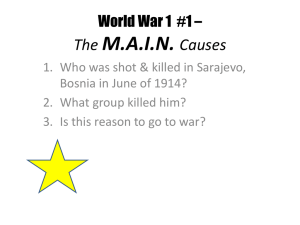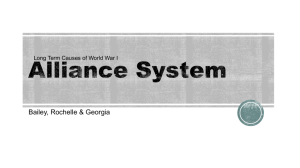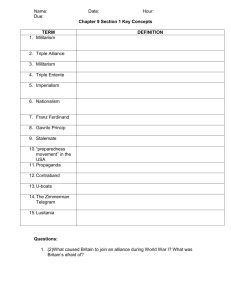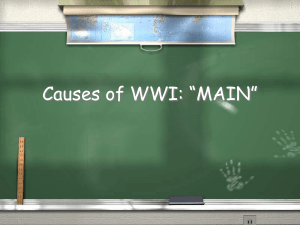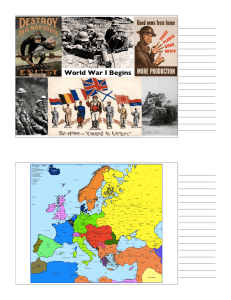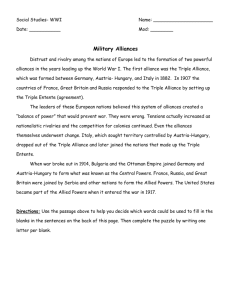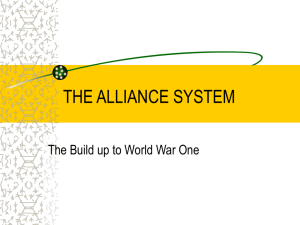9697 HISTORY MARK SCHEME for the May/June 2014 series
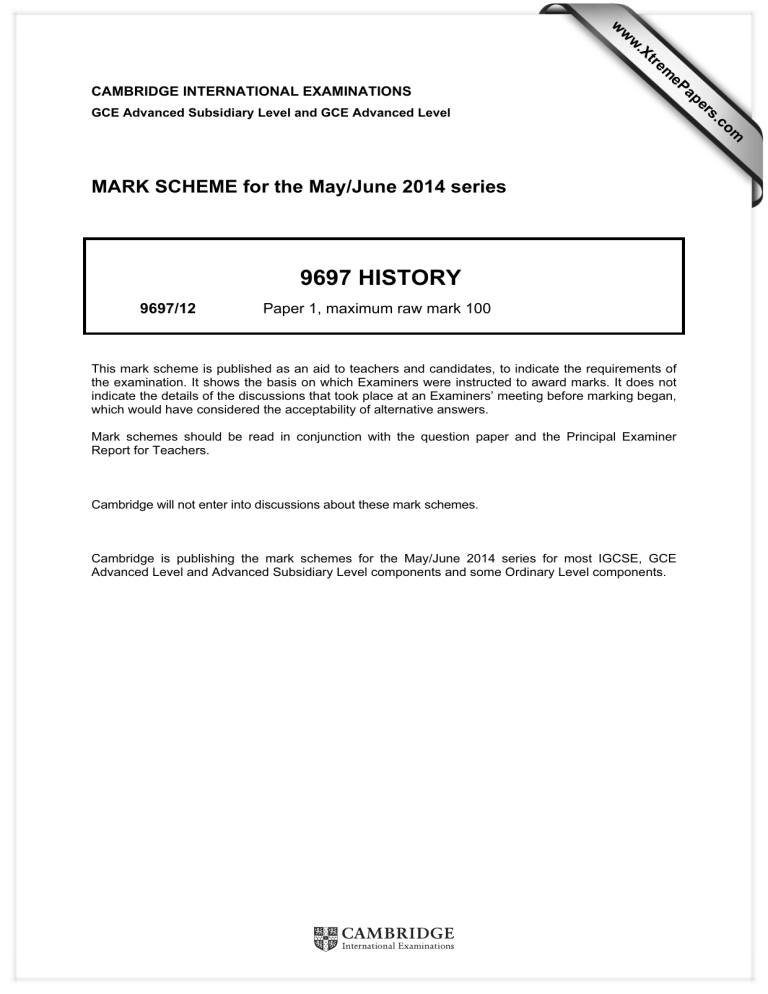
www.XtremePapers.com
CAMBRIDGE INTERNATIONAL EXAMINATIONS
GCE Advanced Subsidiary Level and GCE Advanced Level
MARK SCHEME for the May/June 2014 series
9697 HISTORY
9697/12
Paper 1, maximum raw mark 100
This mark scheme is published as an aid to teachers and candidates, to indicate the requirements of the examination. It shows the basis on which Examiners were instructed to award marks. It does not indicate the details of the discussions that took place at an Examiners’ meeting before marking began, which would have considered the acceptability of alternative answers.
Mark schemes should be read in conjunction with the question paper and the Principal Examiner
Report for Teachers.
Cambridge will not enter into discussions about these mark schemes.
Cambridge is publishing the mark schemes for the May/June 2014 series for most IGCSE, GCE
Advanced Level and Advanced Subsidiary Level components and some Ordinary Level components.
Page 2 Mark Scheme
GCE AS/A LEVEL – May/June 2014
GENERIC MARK BANDS FOR ESSAY QUESTIONS
Band Marks Levels of Response
Syllabus
9697
Paper
12
1 21 The approach will be consistently analytical or explanatory rather than descriptive or narrative. Essays will be fully relevant. The argument will be structured coherently and supported by very appropriate factual material and ideas. The writing will be accurate. At the lower end of the band, there may be some weaker sections but the overall quality will show that the candidate is in control of the argument. The best answers must be awarded 25 marks.
2 18 Essays will be focused clearly on the demands of the question but there will be some unevenness. The approach will be mostly analytical or explanatory rather than descriptive or narrative. The answer will be mostly relevant. Most of the argument will be structured coherently and supported by largely accurate factual material. The impression will be that a good solid answer has been provided.
3 16 Essays will reflect a clear understanding of the question and a fair attempt to provide an argument and factual knowledge to answer it. The approach will contain analysis or explanation but there may be some heavily descriptive or narrative passages. The answer will be largely relevant. Essays will achieve a genuine argument but may lack balance and depth in factual knowledge. Most of the answer will be structured satisfactorily but some parts may lack full coherence.
4 14 Essays will indicate attempts to argue relevantly although often implicitly. The approach will depend more on some heavily descriptive or narrative passages than on analysis or explanation, which may be limited to introductions and conclusions. Factual material, sometimes very full, will be used to impart information or describe events rather than to address directly the requirements of the question. The structure of the argument could be organised more effectively.
5 11 Essays will offer some appropriate elements but there will be little attempt generally to link factual material to the requirements of the question. The approach will lack analysis and the quality of the description or narrative, although sufficiently accurate and relevant to the topic if not the particular question, will not be linked effectively to the argument. The structure will show weaknesses and the treatment of topics within the answer will be unbalanced.
6 8 – 10 Essays will not be properly focused on the requirements of the question. There may be many unsupported assertions and commentaries that lack sufficient factual support. The argument may be of limited relevance to the topic and there may be confusion about the implications of the question.
7 0 – 7 Essays will be characterised by significant irrelevance or arguments that do not begin to make significant points. The answers may be largely fragmentary and incoherent.
© Cambridge International Examinations 2014
Page 3 Mark Scheme
GCE AS/A LEVEL – May/June 2014
SECTION A: THE ORIGINS OF WORLD WAR I, 1870 - 1914
9697/12 HISTORY
Syllabus
9697
Paper
12
SOURCE-BASED QUESTION: ANALYSIS AND EVALUATION
QUESTION: ‘The alliance system was defensive in nature.’ Use Sources A–E to show how far the evidence confirms this statement.
CONTENT ANALYSIS
[L2 – 3]
EVALUATION
[L4 – 5]
CROSS-
REFERENCE
TO OTHER
PASSAGES
OTHER (e.g.
Contextual knowledge)
A An extract from the Dual Alliance of Germany and
Austria.
Bismarck saw
1870 as the end of German expansionism.
Source A might be seen as the beginning of his alliance system to protect
Germany.
Specifically, it was to safeguard
Germany and
Austria from
Russia but it also had other threats in view, unnamed but clearly France was intended.
Y – It is accurate as an extract from an official document.
N-It does not explain clearly the motives for the agreement.
Y/N – While
French recovery and hostility was seen as the greatest danger to Germany, this is referred to only indirectly.
Austria saw
Russia as a greater threat but Bismarck was trying to reach an understanding with Russia at the time.
Y – B agrees that
Germany’s alliances were intended to be defensive.
Y – C views the aims of the alliance system as defensive.
Y – D argues that only the Triple
Entente was a threat to peace.
Germany had been peaceful.
Y/N – E argues that the Triple
Alliance as such was not dangerous because of Italy’s position.
According to E, there was a danger that any crisis might involve the rival alliances and risk war.
Y – E claims that alliances had helped to sort out previous crises.
N – C states that all of the alliances were misconceived and ineffective.
Candidates can explain
Germany’s position after the
Franco-Prussian
War, Bismarck’s priorities and
Austria’s sentiments.
© Cambridge International Examinations 2014
C
Page 4 Mark Scheme
GCE AS/A LEVEL – May/June 2014
Syllabus
9697
Paper
12
Bethmann
Hollweg justifying
Germany’s membership of the Triple
Alliance.
The aims of the two main alliances are given with an emphasis on their different natures: the
Triple Alliance was described as defensive while the Triple
Entente was aggressive.
Y – B makes a valid point about
Britain’s attitude to a balance of power. It was wary of international entanglements that might tie it to one side.
N – It has the usual problems of political speeches.
It defends one side unreservedly and is meant to win support, not to inform objectively.
Y – A agrees that Germany entered alliances for peaceful reasons.
Y – D agrees by implication because the
Triple Entente was aggressive and responsible for war.
Y/N – E is even handed in its judgements of the alliances.
The view that backs the Triple
Alliance against the Triple
Entente might be examined.
Candidates might consider how far
Germany was militaristic.
A British writer’s condemnation of the alliance system.
The universal belief of politicians that alliances would prevent war and maintain a balance of power had been disproved.
Y – Politicians did not expect war in 1914.
Y – Both sides saw their alliances and the scale of military resources as ensuring stability.
Y – D Yes partially because the writer condemns only the Triple
Entente.
Y/N – E sees some positive value in the alliances although it was ultimately a failure.
N – A sees alliances as useful to
Bismarck’s
Germany for defensive reasons.
N – B views alliances as necessary to
Germany.
The individual attitudes of countries towards the respective alliances can be explained.
© Cambridge International Examinations 2014
Page 5 Mark Scheme
GCE AS/A LEVEL – May/June 2014
D Condemnation The Triple the Entente
Cordiale by a
Entente bore all of the controversial person. responsibility for
World War I.
Unlike the Triple
Alliance, it brought only conflict. The members of the
Triple Entente, an artificial creation, were individually more responsible than
Germany.
Y – Some of the points about the differences between the members of the
Triple Entente are justified, e.g. democratic
Britain and autocratic
Russia, past rivalries between
Britain and
France.
Y/N – The notes on provenance give plenty of opportunities for assessment of the source.
Syllabus
9697
Paper
12
Y – A gives indirect agreement because
Bismarck conceived alliances as protecting
Germany, not aggressive.
Y – B agrees fully because the
Triple Entente is a threat to
Germany.
Y/N – C claims that both of the major alliances were threats to peace.
Y/N – Some agreement in E as the alliances failed ultimately.
Y/N – E judges that alliances had some successes but also made war more likely because they could drag major countries into war.
The alleged greater danger of the Triple
Entente can be tested against other knowledge.
E A description of the rival alliances with some comments on their effectiveness.
The limits of alliances are explained but they had been reasonably successful in dealing with a succession of diplomatic crises before 1914.
Y – Description of the nature and commitments of alliances is acceptable.
Y/N – Previous crises had been defused, but was this because of the alliances?
Y – A explains how the Dual
Alliance fitted into
Bismarck’s plans.
Y – B outlines the reasons for the formation of the rival alliances.
N – Sources C and D are both critical of the alliances, if for different reasons.
The links between countries in alliances can be studied and examples of crises can be examined.
© Cambridge International Examinations 2014
Page 6 Mark Scheme Syllabus Paper
GCE AS/A LEVEL – May/June 2014
1 Source-Based
L1 WRITES ABOUT THE HYPOTHESIS, NO USE OF SOURCES
9697 12
[1–5]
These answers write generally about 1914 but will ignore the question, i.e. they will not use the sources as information / evidence to test the given hypothesis. For example, they will not discuss
‘The alliance system was defensive in nature’ but will describe events very generally. Include in this level answers which use information taken from the sources but only in providing a summary of views expressed by the writers, rather than for testing the hypothesis.
L2 USES INFORMATION TAKEN FROM THE SOURCES TO CHALLENGE OR SUPPORT THE
HYPOTHESIS [6–8]
These answers use the sources as information rather than as evidence, i.e. sources are used at face value only with no evaluation / interpretation in context.
For example, ‘The claim that the alliance system was defensive in nature is not justified. Source
B states that the formation of two major alliances in Europe was the signal for an explosion, or an outbreak of war between the major powers. Source C agrees because the alliances achieved nothing positive but completely contradicted the hopes of those who believed that they would make war impossible. Source D also believes that the Triple Entente was the only reason for a major war in 1914.’
L3 USES INFORMATION TAKEN FROM SOURCES TO CHALLENGE AND SUPPORT THE
HYPOTHESIS. [9–13]
These answers know that testing the hypothesis involves both attempting to confirm and to disconfirm it. However, sources are used only at face value.
For example, ‘On the other hand, Source A explains that Bismarck believed that alliances would prevent the outbreak of a war against Germany’s enemies, especially France which sought revenge after its defeat in 1870 – 71 and Austria safeguarding its position against Russia. Source
E maintains that the alliances had some success because they helped to defuse some crises.
Therefore the alliance system was intended to be defensive.’
L4 BY INTERPRETING / EVALUATING SOURCES IN CONTEXT, FINDS EVIDENCE TO
CHALLENGE OR SUPPORT THE HYPOTHESIS. [14–16]
These answers are capable of using sources as evidence, i.e. demonstrating their utility in testing the hypothesis, by interpreting them in their historical context, i.e. not simply accepting them at face value.
For example, ‘The claim that the alliance system was essentially defensive is more convincing if we look at the evidence. Source A agrees and only reflects Germany’s and Austria’s wish to safeguard their defence while E is written by an historian who is quite neutral in his views. As the writer of E states, an analysis of crises before 1914 shows that the alliances did prevent crises turning into wars, especially in Morocco and the Balkans.’
© Cambridge International Examinations 2014
Page 7 Mark Scheme Syllabus Paper
GCE AS/A LEVEL – May/June 2014 9697 12
L5 BY INTERPRETING AND EVALUATING SOURCES IN CONTEXT, FINDS EVIDENCE TO
CHALLENGE AND SUPPORT THE HYPOTHESIS. [17–21]
These answers know that testing the hypothesis involves attempting both to confirm and disconfirm the hypothesis, and are capable of using sources as evidence to do this (i.e. both confirmation and disconfirmation are done at this level).
For example, (L4 plus) ‘...However, the sources can also be interpreted to show that the alliance system was not defensive in its nature and outcome. While Source B can be regarded as unreliable because it is a speech from the German Chancellor to his Parliament, it does not defend completely the alliances of which Germany was a leading partner. Source C was written in 1914 when tensions were at their height and this does not make the source objective. The outbreak of the war with which it deals backs the writer’s claim. He is also justified when he claims that nobody expected war. Source D might be dismissed because of its provenance, written by an enemy of Britain who was later executed for treasonable acts. But some elements are valid. The Triple Alliance had not gone to war before 1914 while the members of the Triple
Entente were indeed very diverse.’
L6 AS L5, PLUS EITHER (a) EXPLAIN WHY EVIDENCE TO CHALLENGE / SUPPORT IS
BETTER / PREFERRED, OR (b) RECONCILES / EXPLAINS PROBLEMS IN THE EVIDENCE
TO SHOW THAT NEITHER CHALLENGE NOR SUPPORT IS TO BE PREFERRED. [22–25]
For (a), the argument must be that the evidence for challenging or supporting the claim is more justified. This must involve a comparative judgement, i.e. not just why some evidence is better, but why some evidence is worse.
For example, ‘Although there is evidence in the Sources both to challenge and support the claim
‘the alliance system was defensive in nature’, the more convincing case is that the claim was mostly justified. The primary sources, B, C and D, are each very subjective. The least convincing is Source D. Its hostility to Britain and the Triple Entente is extreme and the information given about the provenance makes the extract unacceptable. Sources B and C each makes some valid points but they are unconvincing as a group. On the other hand, Sources A and E, while variable in quality, are more convincing. Both can be supported by contextual knowledge...’
OR
For example, ‘Although there is evidence in the Sources both to challenge and support the claim that ‘the alliance system was defensive in nature’, neither case is entirely convincing. Source A is superficially an accurate account of Bismarck’s policies but it does not explain how his preference for protection against France through alliances worked out. It is partial. One of his aims was to isolate France but this was a failure because France became the centre of another anti-German alliance. Source B is also one-sided. It pinpoints the faults of the Triple Entente but accepts no blame for the Triple Alliance. Source C makes the valid point about the failure of the alliances to prevent war in 1914 but does not consider their past records, unlike Source E. Source D is vigorous but unreliable as historical evidence.’
© Cambridge International Examinations 2014
Page 8 Mark Scheme
GCE AS/A LEVEL – May/June 2014
Syllabus
9697
Paper
12
For (b) include all L5 answers which use the evidence to modify the hypothesis (rather than simply seeking to support / contradict) in order to improve it.
For example, ‘An alternative explanation is that it is usual for countries to seek allies. Britain’s policy of splendid isolation was an exception and was abandoned at the beginning of the twentieth century. Both major alliances were formed for defensive reasons but their success depended on the policies of individual countries. Britain remained mostly defensive within the
Triple Entente but otherwise the alliances changed their nature. The hostile attitudes of most countries meant that they both became responsible for the growing tensions that led to the world war. It was not the alliances in themselves that were dangerous but the use to which they were put.’
© Cambridge International Examinations 2014
Page 9 Mark Scheme Syllabus Paper
Section B
GCE AS/A LEVEL – May/June 2014 9697 12
Essay Questions
2 Why did the meeting of the Estates General (1789) not solve Louis XVI’s problems?
The key issue is the reasons why the meeting of the Estates General did not solve Louis XVI’s problems. The most successful answers (in Bands 1 and 2) will be analytical, providing a series of pertinent reasons. Candidates might take different approaches, giving long-term reasons or limiting themselves to short-term factors. Either might merit the highest mark although the danger of the long-term answers is that they provide narrative description with little focus on the key issue itself. A danger might be to take the narrative too far. Answers might go to about 1791 but it is difficult to see how accounts of later years can be made fully relevant. The meeting quickly plunged into wrangles about procedure: the voting: by classes or by head. The first was favoured by the First (although the clergy were more divided than other groups) and Second Estates, the second by the Third Estate. Each saw the alternative as inimical to their interests. Louis XVI did not give a clear line. At first, he seemed to favour voting by classes but then reluctantly conceded. The King soon lost the popularity he gained when he announced the convening of the
Estates General. The cahiers of the different classes showed some communality in their broad demands. This was seen in calls for financial and political changes. This gives candidates the opportunity to explain what these demands were, providing an explanation of the background to
1789. Each called for reform but without the necessary concessions to comprise an agreed programme. Social and economic distress led to violence in Paris and the provinces. The King and his ministers of the time were not capable of formulating a clear and comprehensive plan of action. The Third Estate’s declaration of the National Assembly showed how the situation was getting out of control. The Declaration of the Rights of Man confirmed this impression. Candidates can link the attack on the Bastille and the October Days (March of the Paris women to Versailles) to their argument. 1790 marked a change with the Civil Constitution of the clergy to be followed soon after by war and the Flight to Varennes.
3 How far did the Industrial Revolution depend on the Agricultural Revolution? (You should refer to developments in at least two of Britain, France and Germany in your answer.)
The key issue is the link between the Agricultural and Industrial Revolutions. Candidates are asked to refer to at least two of Britain, France and Germany. References to three countries will not normally be worth more than to two countries except that three might reflect more understanding and useful knowledge. The question asks ’How far?’ and answers in Bands 1 and
2 can be expected to assess agricultural changes against other factors that produced industrialisation. A basic understanding of agrarian change will be needed for most answers in
Band 5. However, it is possible to argue that the Agricultural Revolution – if there was one – was less important than other factors and therefore it is justified to give it a minor role in answers. An
Agricultural Revolution is probably a more accurate term to apply to Britain than to France and
Germany. Land was farmed more intensively. This produced larger harvests. The end of a traditional three-field system produced better yields, as did the widespread growth of enclosed land. The availability of food sustained a larger population that was needed for industrialisation while more economic methods provided fewer employment opportunities in rural areas, giving rise to the move towards towns and cities and employment in factories. There were also changes in transportation, especially better roads and canals, which moved commodities faster and more cheaply. Other factors that contributed to industrialisation included capital investment linked to industry. This was necessary but changed in character. First from private individuals and small groups, it became dominated by larger banks and joint stock companies which could make greater profits as well as greater risks. Railway systems were a means of tapping raw materials such as coal. Steam developments also created larger machines in factories. The ability to take
© Cambridge International Examinations 2014
Page 10 Mark Scheme Syllabus Paper
GCE AS/A LEVEL – May/June 2014 9697 12 advantage of overseas trade for materials and markets became more significant. Domestic markets increased in the larger towns.
4 Why did Prussia become the leader of German unification during the period from 1848 to
1871?
The key issue is the leading role of Prussia in German unification. Examiners can expect answers to focus on Bismarck, a valid approach, but answers in Band 1 and most in Band 2 should also consider other factors. The question begins in 1848. Bismarck came to power in 1862, therefore unlikely to reach Band 1 if answers begin at this point. The Frankfurt Parliament offered the crown of a united Germany to Frederick William IV in 1849. Although he refused it, the offer reflected Prussia’s position in Germany at that stage. The Zollverein already signified Prussia’s leading role, especially because Austria was excluded. It was larger in size than other German provinces and was economically more advanced. Candidates can discuss Prussia’s economic strength. It had most railways. It had larger mineral resources. It had more capital and banks, for example the Prussian Bank that became the Imperial Bank of Germany. Many of its towns were prosperous. In spite of unwillingness to take the crown, Frederick William IV maintained the hopes of liberals by granting a constitution. The authority of the King, including the appointment of ministers, was still considerable, an important point when it came to unification. The Erfurt
Union failed but was another sign of the way in which German politics were moving. Bismarck’s appointment as Minister-President was decisive but not at first for national unification unless one holds the view that this was always Bismarck’s primary aim. He strengthened Prussia through the budget debate and supported the army reforms of von Roon and Moltke. Prussia’s reliance on the army, important in unification, was demonstrated in the Danish War and then the war with
Austria (1864 and 1866). Finally there was war with France. Bismarck did not only solve the problems of Austria and France. The North German Confederation (1867) solved the problem of the mainly Protestant states in the north. The German Empire (1871) solved the problem of the southern mainly Catholic states.
5 Why did Imperialism enjoy wide public support in Europe in the late nineteenth century?
The key issue is the reason why Imperialism was widely supported by public opinion in the late nineteenth century. The focus on public opinion means that other factors should be linked to this to deserve higher credit. However, it is valid to point out briefly that other factors were important in Imperialism although this is not to be required for any mark. Few are likely to disagree that public opinion was important although some excellent candidates might point out the limitations of this claim. The poor were more concerned about social and economic issues that affected them directly and there is evidence that the middle classes were most enthusiastic. However, politicians, including right-wing figures such as Bismarck and Disraeli and left-wing politicians in the French Third Republic, believed that Imperialism was a popular issue in the ballot box. British writers such as Kipling had their equivalents on the continent. New mass circulation newspapers and magazines found stories about imperial adventures to be popular. Public opinion supported the ‘civilising’ aspect of imperialism. Individuals such as Rhodes (at least until the Jameson Raid),
Livingstone, Stanley and Karl Peters became popular heroes. Missionaries had a special place in people’s affections and official propaganda. Public opinion joined in the support for imperial expansion as a measure of national greatness. This was used by Britain, France, Germany and
Italy even when the gains were of little value. There was enthusiasm for military exploits as long as they were successful. Gordon’s defeat and death in 1885 caused an outcry against
Gladstone’s government. Kitchener then became a national hero. (The Boer War was probably a turning point in enthusiasm for Imperialism in Britain; later than the question specifies but acceptable.) Some of the public, but not all, benefited from imports of more exotic commodities.
Some have argued the case for the benefits of employment in empires but this benefited few.
Another case has been made out for the importance of capital in New Imperialism. This has been discredited but might still be stated in some of the books that are studied. In any case, surplus
© Cambridge International Examinations 2014
Page 11 Mark Scheme Syllabus Paper
GCE AS/A LEVEL – May/June 2014 9697 12 capital was not an issue that would have affected public opinion widely. Examiners will look for examples to support arguments.
6 ‘The decision to continue the war against Germany was the most important reason why the Provisional Government was overthrown in October 1917.’ How far do you agree with this claim?
The key issue is the replacement of the Provisional Government by the Bolsheviks in 1917. The focus of the question is narrow and it is difficult to see how arguments based on the period before
February 1917 or after October 1917 can be made relevant unless used in brief introductions or conclusions. To explain ‘How far…?’, the answers in Band 1 and most in Band 2 will be analytical, suggesting and assessing a variety of reasons. Candidates do not necessarily have to agree with the stated claim but should show a reasonable understanding of it for Band 3+. The points will have to be supported by knowledge but examiners should not undervalue answers that use description to underline explanation. It is reasonable to expect a fair balance in the discussions of the Bolsheviks and the Provisional Government. Band 5 will require a basic understanding and knowledge of either the Bolsheviks of the Provisional Government. The
‘Provisional’ status of the government was a weakness and it did not call elections for a
Constituent Assembly until it was too late. Power was shared with other groups, such as the soviets. Kerensky could not get to grips with the widespread grievances in Russia, for example economic distress, the demands for land distribution, concessions to nationalities and above all peace. The Provisional Government continued the war and was involved with the failure of the
Brusilov offensive in June-August. The crisis of the July Days showed the weakness of the
Provisional Government although Lenin had to withdraw to Finland. The Kornilov Affair represented another crisis. The influence of the Bolsheviks was spreading rapidly in the soviets and elsewhere. Trotsky became a significant leader when he joined the Bolsheviks. Above all,
Lenin’s leadership was decisive. His popular slogans, ‘All power to the Soviets’, ‘Peace, land and bread’ won considerable support. He also secured support among soldiers. He persuaded a reluctant Central Committee to support a coup. Good responses might consider how far the fortunes of the Bolsheviks changed in 1917. Success was unlikely until shortly before October unless one accepts the communist line of an inevitable victory.
7 ‘A Stalinist but not a Marxist country.’ How accurate is this this judgement of the USSR from 1924 to 1939?
The key issue is whether Russia was a Stalinist rather than a Marxist country from 1924 to 1939.
Marxism was a combination of economic, social and political theories. Economic changes would end the supremacy of capitalism to give way to control by the proletariat. Social classes would disappear and the state would wither away. Answers should be given credit when they point out that Russia was not Stalinist in 1924 because, in that year of Lenin’s death, Stalin had not established himself in power. Lenin had gone a long way to changing Russia but, in spite of his claims, the country was not Marxist. His NEP was a step back while the one-party state, enforced by the Cheka and other agencies, saw the state grow and not diminish in importance. Stalin gained very considerable personal power but it is arguable whether his economic reforms, above all agrarian collectivisation and rapid industrialisation, were motivated by Marxism whatever the official claims that were made. The case for a Stalinist Russia can be made by referring to
Stalin’s personal power that largely depended on force, purges and propaganda. Not even the merest hint of deviation was allowed. His personal position was unlike anything that Marxism advocated.
© Cambridge International Examinations 2014
Page 12 Mark Scheme Syllabus Paper
GCE AS/A LEVEL – May/June 2014 9697 12
8 Which benefited the middle classes more in the nineteenth century: Liberalism or the
Industrial Revolution?
The key issue is the relative benefits to the middle classes of Liberalism and the Industrial
Revolution. Examiners will expect a reasonable but not equal balance between the two stated factors for Band 1 and most of Band 2 because the balance will depend on the argument. Band 5 will require a basic understanding of one. Candidates can be expected to provide some examples, probably from some of Britain, France and Germany to support arguments that will otherwise be general. Some might use Russia as a contrasting country. Liberalism provided the middle classes with a measure of political influence through widened franchise. This was apparent in each of the three countries by the end of the nineteenth century. Each had constitutional governments. Liberalism resulted in a greater regard for open and impartial justice.
Freedom of expression grew. The middle classes were not the only beneficiaries of these developments but they were affected. The Industrial Revolution saw the middle classes gain economically. They profited through investments. There were traders and financiers. Many became employers or gained through peripheral activities such as lawyers. Older landed interests maintained their pre-eminence during the course of the century but they were now being rivalled by the middle classes. Economic policies of governments reflected the change in favour of the middle classes who sought freedom from traditional restrictive practices. If the Industrial
Revolution did not create the middle classes, they probably gained more than other social groups.
© Cambridge International Examinations 2014
